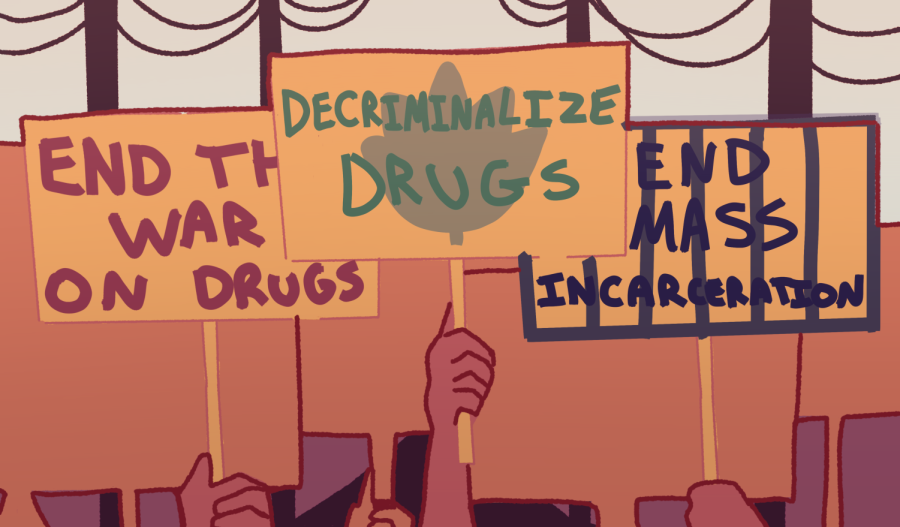Opinion | Let drug decriminalization win the War on Drugs | Part II
March 25, 2022
As already explained, besides tumultuous government regulation, another option to end the War on Drugs is to decriminalize drugs.
Decriminalization when it comes to drugs means the use and/or possession of drugs have no criminal charges, or the charges are no longer a federal violation and more so a civil violation. To see how decriminalization works, one can turn their eye to Portugal or Oregon where drugs are decriminalized.
Oregon took a huge leap two years ago and decriminalized all drugs, being the first state to do so in passing legislation called Measure 110. In Oregon, selling drugs and drugs themselves are illegal, but possession is a civil violation that results in a fine or therapy. Some might question how this would be funded.
According to Ballotpedia, this initiative would “receive funds from the Oregon Marijuana Account and state savings from reductions in arrests, incarceration and official supervision.” On top of this, any revenue excess of $11.25 million would be transferred to this initiative every quarter and grants would be given to community-run organizations.
This can be seen as a rejection of the prohibition of drugs and the war being waged against them. However, one must realize that this was only able to happen due to funding and ballot initiatives, initiatives by which citizens can propose to create, amend or repeal a state law by collecting enough signatures from a certain minimum number of registered voters. The funding for this measure comes from the Drug Policy Alliance, a New York nonprofit that spent $3.5 million gathering signatures.
Get The Daily Illini in your inbox!
After hearing all of this, one might wonder what the results may look like, but it is too hard to tell given that it has only been two years and looking at this now could hurt future implementation within the states. Instead, we should look toward Portugal.
In 2001, Portugal decriminalized all drugs in an attempt to broaden the effort to encourage treatment. Drugs are still illegal to sell, but just as in Oregon, possession results in a fine or court-ordered rehabilitation. Given that it has been two decades since this implementation, we can look at the long-term effects this has had on Portugal’s society.
When comparing Portugal to the rest of Europe, one can see that drug-related deaths have decreased, especially in the first five years after the reform. The crime rates have dropped as well. In 2001, 40% of the Portugal prison population was due to drug offenses and 70% of reported crimes originated from drugs. However, over the years the amount of people sentenced to drug offenses has fallen to 15.7% — quite the decrease. Even drug use has fallen in Portugal, especially those among the ages of 15-34.
Some may argue against decriminalization by questioning what example this leaves for children. But one must realize drug usage is at an all-time high during this prohibition era. Just because a good has been prohibited does not mean that the market for the good has been eliminated. Instead, prohibition shrinks the market, raises prices and costs and creates a black market with unwanted side effects.
Some other benefits of decriminalization are that it would put the money to better use, address the stigma around drugs and addiction and allow people who are suffering to get help.
After realizing how much legislative effort is required in any kind of reform, one might wonder if decriminalization would happen any time soon within the United States. It would definitely take time and the benefits would be great. Nonetheless, one must also think of how those already incarcerated for such crimes would be affected by such policies. Therefore, we should let drugs win this war, so those incarcerated and affected, the prisoners of this war, can be sent home and be given proper treatment and care.
Aditya is a junior in Business.







